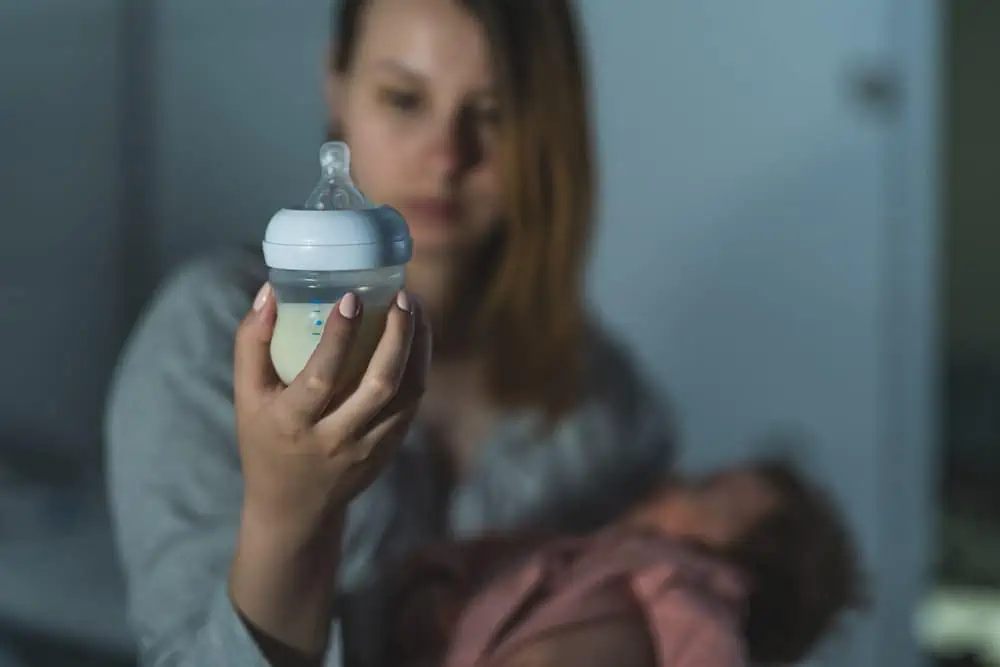What Is NEC in Newborns / Babies?
- Last Updated: August 3rd, 2023

Attorney Jessica Paluch-Hoerman, founder of TruLaw, has over 28 years of experience as a personal injury and mass tort attorney, and previously worked as an international tax attorney at Deloitte. Jessie collaborates with attorneys nationwide — enabling her to share reliable, up-to-date legal information with our readers.
Legally Reviewed
This article has been written and reviewed for legal accuracy and clarity by the team of writers and legal experts at TruLaw and is as accurate as possible. This content should not be taken as legal advice from an attorney. If you would like to learn more about our owner and experienced injury lawyer, Jessie Paluch, you can do so here.
Fact-Checked
TruLaw does everything possible to make sure the information in this article is up to date and accurate. If you need specific legal advice about your case, contact us by using the chat on the bottom of this page. This article should not be taken as advice from an attorney.
What Is NEC in Newborns / Babies?
Necrotizing enterocolitis, also known as NEC, is a gastrointestinal disease that primarily affects preterm babies, especially those who have been fed bovine milk-based formulas like Enfamil and Similac.
NEC has been shown to cause inflammation in the intestinal tissue, which can lead to tissue damage or tissue death, and even perforations, or holes in the intestinal wall.

If perforations occur, bacteria could seep into the abdominal cavity or pass into the bloodstream, causing a severe infection.
Depending on the level of tissue death, some portions of the baby’s intestines might need to be surgically removed.
NEC is the most common intestinal illness in preterm infants and can occur in the large or small intestine.
While some infants only experience mild NEC, it can also be a life-threatening condition.
Table of Contents
Symptoms of NEC in Babies
NEC usually occurs within two to six weeks after a baby is born.
In some cases, symptoms begin to appear gradually, but in other cases, symptoms of NEC might show up immediately.
Some of the most common symptoms of NEC in infants include:
- Pain in the abdominal area
- Yellow or green vomit
- Bloody stools
- Diarrhea
- Fatigue
- Changes in breathing patterns
- Abnormal fluctuations in heart rate, body temperature, and blood pressure
- Difficulty eating
- Difficulty gaining weight

NEC is diagnosed using blood tests that look for specific bacteria, fecal tests that test for blood in an infant’s stool, and abdominal X-rays that may reveal abnormalities in the gut.
Left untreated, NEC can cause severe complications, including short bowel syndrome, gut rot, intestinal strictures, sepsis, and bacterial infections in the abdomen.
Symptoms such as an upset stomach, gas, or diarrhea can also be caused by a mild allergy to a certain formula.
Consider switching formulas to rule out this option.
How Common Is NEC?
NEC is common in premature babies.
Babies weighing under two pounds are the most vulnerable to the disease.
According to the Cleveland Clinic, roughly 1 in 1,000 preterm infants suffers from NEC.
Babies who were not born prematurely are rarely affected by NEC, though it does still occur in about one in 10,000 full-term infants.
Types of NEC
There are a few different types of NEC in preterm infants, including classic, atypical, transfusion, and full-term.
Classic NEC is the most common type and impacts premature babies who were born prior to the 28th week of pregnancy.
Symptoms of classic NEC begin to show in as little as three weeks after birth.
The onset of classic NEC tends to be sudden and unexpected.
Transfusion-related NEC can occur if a baby receives a blood transfusion.
About one-third of all premature babies who receive a blood transfusion go on to develop symptoms of NEC within a three-day window.
Atypical NEC is rare, hence the name, and applies to premature babies who suffer symptoms of NEC within the week after delivery.
Finally, full-term NEC applies to full-term infants who contract the disease.
When a full-term infant comes down with NEC, it is usually due to a birth defect, such as a heart or gastrointestinal defect.
Causes of NEC
While the cause of NEC in preterm infants is not fully understood by medical professionals, the fact that premature and underweight babies tend to be immunocompromised is certainly a contributing factor.
Full-term infants tend to have a more robust immune system that can fight the bacteria that cause NEC, but preterm babies’ immune systems often don’t have the strength to prevent infection.
On top of being immunocompromised, premature infants have weaker digestive systems.
Because their immune and digestive systems are not functioning properly, their bodies have a harder time fighting NEC.
Premature babies also often experience decreased circulation.
When the intestines can’t get the oxygen they need due to reduced blood flow the intestinal lining can become damaged, causing bacteria to escape into the infant’s bloodstream or into the abdomen.
NEC Lawsuits
Recent research, such as a 2019 study conducted by the Cochrane Database of Systematic Reviews, has exposed the danger of feeding cow’s milk-based baby formula products like Enfamil and Similac to newborns, especially premature and underweight infants.
Instances of NEC are higher in premature babies who consume these formula products than in those who only consume breast milk.
As a result of these studies, parents whose infants suffered harm or even died due to NEC after being fed bovine milk-based baby formula are bringing lawsuits against the manufacturers of these popular products.
Many of these lawsuits are ongoing.
About 3.18 million Americans have used Similac formula, and about 3.22 million Americans have fed their infants Enfamil formula.
If you are the parent of an infant who developed NEC, you could be eligible to file a lawsuit if your child was born prematurely, received the bovine-milk-based formulas Similac or Enfamil, and was diagnosed with NEC.
If you believe your baby has suffered from NEC due to cow’s milk-based formulas such as Enfamil and Similac, you may be entitled to compensation, but you must act quickly and file a suit before the statue of limitations expires.
TruLaw and its team of seasoned lawyers fight on behalf of individuals harmed by drugs, devices, chemicals, and other products.
To date, TruLaw and its partner law firms have successfully collected over $3 billion through verdicts and settlements in all 50 states.
Use our Instant Case Evaluator to find out if you are eligible for a Necrotizing Enterocolitis (NEC) lawsuit today.

Managing Attorney & Owner
With over 25 years of legal experience, Jessica Paluch-Hoerman is an Illinois lawyer, a CPA, and a mother of three. She spent the first decade of her career working as an international tax attorney at Deloitte.
In 2009, Jessie co-founded her own law firm with her husband – which has scaled to over 30 employees since its conception.
In 2016, Jessie founded TruLaw, which allows her to collaborate with attorneys and legal experts across the United States on a daily basis. This hypervaluable network of experts is what enables her to share the most reliable, accurate, and up-to-date legal information with our readers!
Here, at TruLaw, we’re committed to helping victims get the justice they deserve.
Alongside our partner law firms, we have successfully collected over $3 Billion in verdicts and settlements on behalf of injured individuals.
Would you like our help?
At TruLaw, we fiercely combat corporations that endanger individuals’ well-being. If you’ve suffered injuries and believe these well-funded entities should be held accountable, we’re here for you.
With TruLaw, you gain access to successful and seasoned lawyers who maximize your chances of success. Our lawyers invest in you—they do not receive a dime until your lawsuit reaches a successful resolution!
AFFF Lawsuit claims are being filed against manufacturers of aqueous film-forming foam (AFFF), commonly used in firefighting.
Claims allege that companies such as 3M, DuPont, and Tyco Fire Products failed to adequately warn users about the potential dangers of AFFF exposure — including increased risks of various cancers and diseases.
Depo Provera Lawsuit claims are being filed by individuals who allege they developed meningioma (a type of brain tumor) after receiving Depo-Provera birth control injections.
A 2024 study found that women using Depo-Provera for at least 1 year are five times more likely to develop meningioma brain tumors compared to those not using the drug.
Suboxone Tooth Decay Lawsuit claims are being filed against Indivior, the manufacturer of Suboxone, a medication used to treat opioid addiction.
Claims allege that Indivior failed to adequately warn users about the potential dangers of severe tooth decay and dental injuries associated with Suboxone’s sublingual film version.
Social Media Harm Lawsuits are being filed against social media companies for allegedly causing mental health issues in children and teens.
Claims allege that companies like Meta, Google, ByteDance, and Snap designed addictive platforms that led to anxiety, depression, and other mental health issues without adequately warning users or parents.
Transvaginal Mesh Lawsuits are being filed against manufacturers of transvaginal mesh products used to treat pelvic organ prolapse (POP) and stress urinary incontinence (SUI).
Claims allege that companies like Ethicon, C.R. Bard, and Boston Scientific failed to adequately warn about potential dangers — including erosion, pain, and infection.
Bair Hugger Warming Blanket Lawsuits involve claims against 3M — alleging their surgical warming blankets caused severe infections and complications (particularly in hip and knee replacement surgeries).
Plaintiffs claim 3M failed to warn about potential risks — despite knowing about increased risk of deep joint infections since 2011.
Baby Formula NEC Lawsuit claims are being filed against manufacturers of cow’s milk-based baby formula products.
Claims allege that companies like Abbott Laboratories (Similac) and Mead Johnson & Company (Enfamil) failed to warn about the increased risk of necrotizing enterocolitis (NEC) in premature infants.
Here, at TruLaw, we’re committed to helping victims get the justice they deserve.
Alongside our partner law firms, we have successfully collected over $3 Billion in verdicts and settlements on behalf of injured individuals.
Would you like our help?








